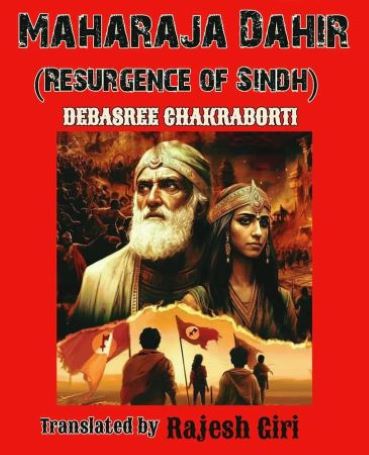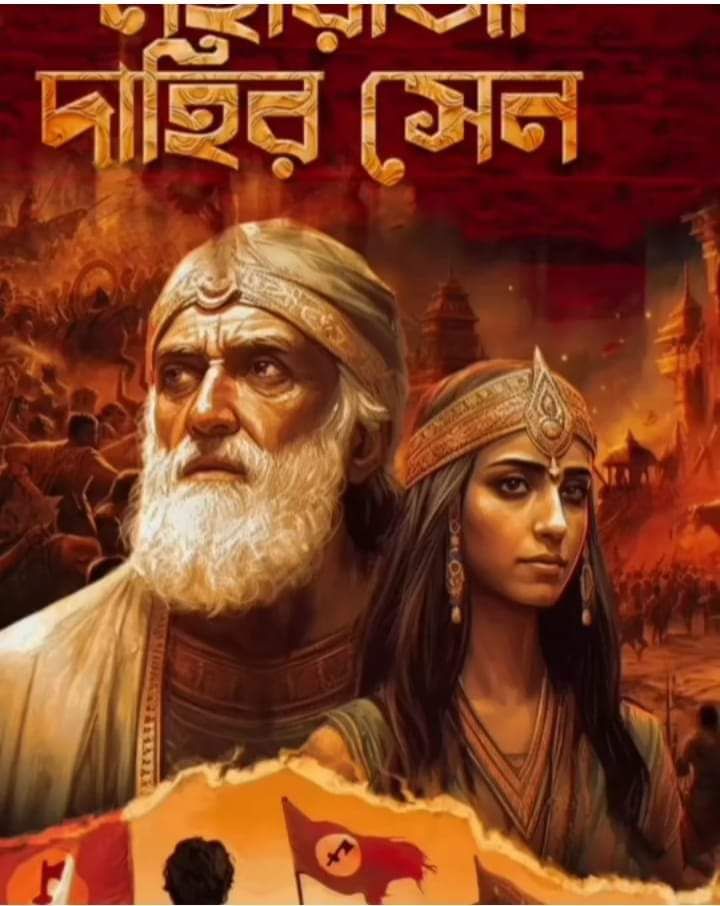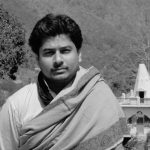
The English translation of a novel ‘Maharaja Dahir’ authored by Kolkata-based renowned novelist Debasree Chakraborti in Bengali language. The novel has been translated by Rajesh Giri
While Muhammad bin Qasim had set up his camp at some distance from the city of Jitor, Maharaja Dahir’s army began to prepare for battle on the banks of a lake between Raor and Jitor. While Yuvraj Jai Singh himself supervised the Bet fort, he was in daily communication with the troops at Raor, Jitor and with the troops on the banks of the lake between these two cities. These troops are selected and controlled completely by him. Muhammad Alafi had left his spies in the Sindh army, so the prince had to reorganize his forces. He had an army under his control, with Nerun as well as other neighboring rulers joined with Jaisingh along with their forces. These soldiers also worked as spy in disguise. One evening, from the western side of the lake between the cities of Raor and Jitor, an army man on horseback started rushing towards the army camp.
Watching the white turban on the head of the man, Pushkar, the commander-in-chief of this army camp, realized that Prince Jai Singh was coming. They all know that all news are delivered to Jai Singh. Jai Singh has spy among them also.
The nature has turned crimson. Pushkar slowly walks forward with the burning flambeau in hand and stands on the bank of the lake. There is a pole for holding torch, he placing the flambeau on that pole, waits. When Yuvraj Jai Singh’s horse came to a halt, a guard ran up and hold the horse, then when Yuvraj got down from the horse, General Pushkar advanced towards him with folded hands and bowed. They both went and sat on two rock base by the lake. The white herons used to gather here and feast on fishes with zeal at this time. They watch the bird’s feasting for a while— the birds consuming fishes tearing them apart alive, this turns down the mind heavily. For some time the breeze coming from the lake and the calls of the herons act as the background music in this situation. Then Yuvraj Jaisingh said, “I heard that the dead bodies of herdsmen are being found in the pastures across the river; 33 dead bodies of herdsmen have been found in the past few days.”
Pushkar said, “Yuvraj, the animals that these herdsmen had taken to the pastures are also not being found. I do not understand why they have collected a huge number of animals looted from those 33 herdsmen.”
Yuvraj said, “They are looting cows. There must be a very bad motive behind it. Cow-mother is goddess Bhagavati to us, there is a conspiracy to hurt our religious sentiments by injuring her.”
“But Yuvraj, it doesn’t seem so simple, they might have some more sinister motive behind it. But I don’t understand how they will use the cow.”
Jaisingh said, “I heard that the dead bodies of herdsmen are being found in the pastures across the river; 33 dead bodies of herdsmen have been found in the past few days.”
—Most importantly, they have been staying outside the city of Jitor for a long time. They never wait that long before attacking a city. The biggest thing is that nothing is comprehended about where they are removing these cattle after looting them.
—Yuvraj, how do you understand? For the past few days, several of our informers have also been disappeared. Their bodies are not found.
—This means that there are agents of Arab army in our forces, otherwise who is betraying our forces? Or it may be that those whom we employ as our scouts, are actually agents of the Arabs, who have long been concealed in the army of Sindh in disguise, as was Muhammad Alafi. Tomorrow send some army to Jitor, I will not let Jitor fall in any way.

Early next morning the roar of Allah Hu Akbar came from the wilderness beyond the city walls of Jitor towards the city like a battle cry. Prince Jaisingh’s army was ready on top of the city wall of Jitor, they started to shower arrows while shouting Har Har Mahadev at the Arab army. In a few moments several thousand soldiers fell to their deaths in the torrent of arrows, and then suddenly a herd of cows burst forth from within the Arab army, forming a shield in front of them. Cow is equivalent to mother to Hindus, Hindu soldiers lay down their arms in the presence of the cow. Guards from the top of the city walls rushed towards the bet fort, they approached prince Jaisingh inside the fort and informed that the Yavana soldiers were fighting in the battlefield, shielding themselves with cows.
Now he understood the reason behind the killing of 33 herdsmen and looting of cattle. Jaisingh belongs to the lineage of Brahmin, if a cow is killed by a Brahmin, that sin is considered the pinnacle of all sin. He was engrossed in the thought of how to formulate a strategy. At that moment, the city wall collapsed with a terrible noise. The Arabs had a special kind of machinery, by which they bring down the walls by catapulting rocks, in the same manner they tore down the walls of other cities of Sindh.
The Indus soldiers of Jitor did not understand that such a strong wall would be broken so easily by the Arabs. As soon as the wall got collapsed, the soldiers on top of the wall died. Then the Arabs entered Jitor with cows in front and started killing indiscriminately, they entered the houses of common people and started looting and raping women. Soldiers stationed in different parts of the city died bravely fighting the Arabs. Because they are helpless to do anything which may cause harm their religious beliefs and faith, it was very difficult to attack the cows with weapons in front of them. The long preparation and their mobilization to carry on the war became very difficult. Hindus had some rules of war, first of all, war cannot be conducted in locality; war must be organized in a deserted field. Unarmed or wounded soldiers cannot be harmed in battle, and after sunset there will be no more battles. But the Arab soldiers were not following any of these rules. There was no specific time for their attacks either. In the battle of Jitor they conducted this war by hurting the religious sentiments of the Hindus.
An army personal came to Jaisingh and said, “Prince, many of our soldiers are randomly killing their own comrades. All over the city our own troops are fighting against us along with Arab troops. In such circumstances it is absolutely impossible for us to win this war.”
Jaisingh said, “I will give one last try in time. As he descends on the ground floor of the bet fort with the army personal, he witnessed hundreds of dismembered bodies of soldiers. Jaisingh had the clothes of the Arab army, he secretly disguised himself and came out of the fort. His troops are still fighting hard. Jaisingh thought that this war would never be possible to continue alone by him. He prepared the army with his own hands. But he did not realize that the Arab soldiers would be hiding in him. In such a situation he had to take the help of neighboring rulers including Hind, if Sindh could be saved.
He somehow got out of Jitor in disguise and reached the shore of the lake between Raor and Jitor. Finding an Arab army approaching, the Pushkar army became alarmed. But Yuvraj Jaisingh continued to advance with the flag of Sindh in his right hand. When Pushkar’s army was fully prepared to attack the intruder, Pushkar saw the flag and forbade them to attack. Jaisingh came to Pushkar and said, “They are hidden in our army, save Jitor, Pushkar, you are my last asset, if you can, save Jitor, otherwise Jitor’s downfall is evident. I myself preparing for last-ditch effort.”
Jaisingh let Pushkar army for Jitor and sat for a while looking at the water of that lake. He felt a stream of blood coming from the direction of Jitor and mixing with the water of this lake, in a moment the water of the lake turned bloody. As if he could hear jitor’s screams, Jitor’s humanoid projection seemed to be melting away slowly. The blood and tormented flesh of the city of Jitor is being blended with the water of this lake with the stream of blood. Rotting smell of human flesh created a disgusting environment around. The white egret on the banks of the lake took the form of vultures tearing apart the flesh of men and hovering in the sky, their screams can no longer be tolerated, the prince sets out on his horse for Raor.
The battle continued for ten days, the Pushkar army and Jaisingh’s army present at Jitore desperately tried to defend Jitor. But more Arab troops from Makran by sea and land began to reach Jitor with arms. Meanwhile, the Sindh army did not have so many weapons. Rules of Indus strategy was unarmed soldiers can never be harmed. But when the troops of the Sindh became bereft of weapon, the Arabs pounced on them, attacked them from all sides and started killing the unarmed soldiers. Pushkar’s death was the most gruesome of all, he was tied hand and foot to a pole and burned alive. Mohammad Alafi set fire to Pushkar’s body with his own hands, he said while setting fire, “I want to set you on fire with my own hands before you go to hell, you will be set on fire again when you go there. But I myself will not be there to enjoy your terrible screaming. The defeat of an army equivalent to his death, so I want to cremate your body according to prescribed ritual of your religion. You Hindus put fire in your face first, hey, I put fire in your face…”
The Arab soldiers dismembered the corpses of the Sindh soldiers and scattered them along the banks of the lake on the way from Jitor to Raor.
Saying this he set Pushkar’s body on fire, then while it was still burning, severed his head from his body and placed it on a torch holder and fragmented his body brutally and was scattered by the lake. When Pushkar’s head was severed from his body, he was still alive.
After the victory of Jitor, Mohammad Alafi announced to the Arab troops that the stench of the victory of Jitor should spread far and wide. This odor will create an atmosphere of fear towards Islam in the surroundings. After that no one will have the courage to fight against Islam; everyone will fall at the feet of Islam without a fight. You start dismembering these bodies and spreading them from Jitor to Raor. The Arab soldiers dismembered the corpses of the Sindh soldiers and scattered them along the banks of the lake on the way from Jitor to Raor.
Groups of vultures and kites started flocking around from all directions for the greed of this sumptuous meat. They take these meats by air to the locality and start eating them. The people of the Indus were vegetarians, their lives made miserable by the smell of rotting flesh. Due to the ongoing prolonged massacre the sky littered with ravenous vultures; the brutality grew exponentially when Mohammad Alafi joined the Arab army. The people should start to witness hell during their lifetime. (Continues)
Click here for Part-I , Part-II, Part-III , Part-IV , Part-V , Part-VI , Part-VII, Part-VIII , Part-IX , Part-X, Part-XI, Part-XII, Part-XIII , Part-XIV , Part-XV , Part-XVI, Part-XVII, Part-XVIII , Part-XIX, Part-XX, Part-XXI , Part-XXII, Part-XXIII , Part-XXIV , Part-XXV , Part-XXVI, Part-XXVII, Part-XXVIII, Part-XXIX, Part-XXX , Part-XXXI, Part-XXXII, Part-XXXIII , Part-XXXIV , Part-XXXV
____________________
 Debasree Chakraborti is a renowned novel writer of Bengali language. Based in Kolkata, West Bengal, India, she has done Master’s in Modern History from the Kolkata University, and authored some thirty books, mostly the novels, with historical perspective and themes. Her most recent novel is ‘Maharaja Dahir’ that covers the history of Sindh from 662, the year of first attack on Sindh by the Arab armies till date.
Debasree Chakraborti is a renowned novel writer of Bengali language. Based in Kolkata, West Bengal, India, she has done Master’s in Modern History from the Kolkata University, and authored some thirty books, mostly the novels, with historical perspective and themes. Her most recent novel is ‘Maharaja Dahir’ that covers the history of Sindh from 662, the year of first attack on Sindh by the Arab armies till date.
 Rajesh Giri, born in Kolkata, had his early schooling from Kolkata and then from Medinipur—a village in Bengal. He graduated from Calcutta University with Physics and Maths and Master’s from Burdwan University in 2016. Now he is associated with Adhdhyaan educational institution teaching Physics. History enthusiastic Rajesh Giri is particularly interested in the ancient civilization of India and other regions like Egypt, Mesopotamia, and North America. He loves traveling.
Rajesh Giri, born in Kolkata, had his early schooling from Kolkata and then from Medinipur—a village in Bengal. He graduated from Calcutta University with Physics and Maths and Master’s from Burdwan University in 2016. Now he is associated with Adhdhyaan educational institution teaching Physics. History enthusiastic Rajesh Giri is particularly interested in the ancient civilization of India and other regions like Egypt, Mesopotamia, and North America. He loves traveling.